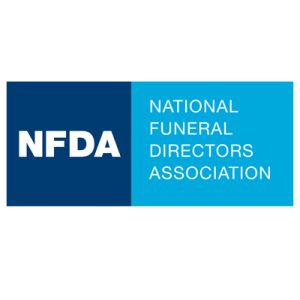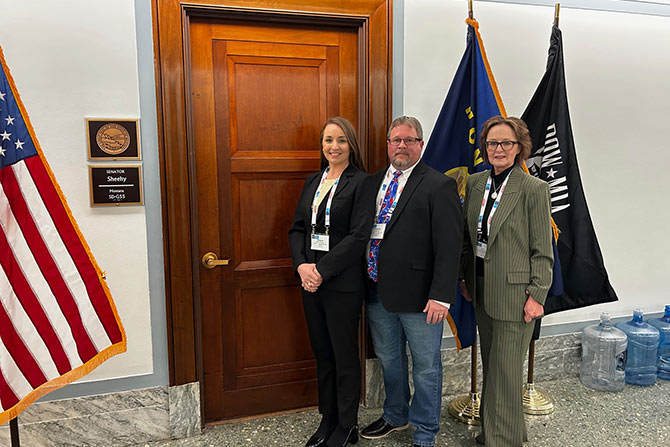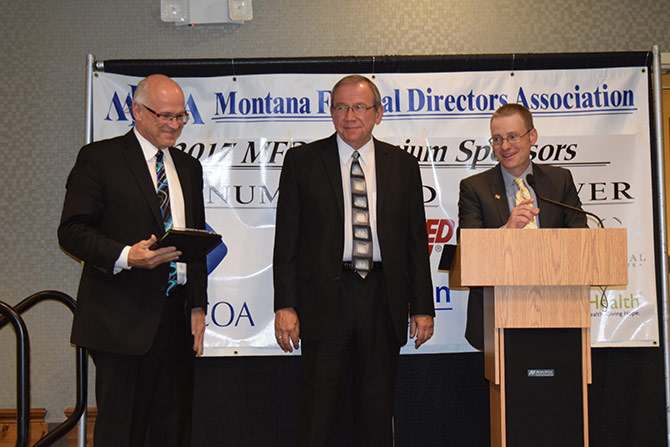Happy spring!
Here are just a few notes on what is happening with the NFDA and our trip to Washington, D.C.
We flew into D.C. in early April for the Advocacy Summit with NFDA and hundreds of funeral directors from across the nation to advocate for issues facing our industry to our respective legislative delegates.
Terri James, Bri Mulvaney and myself, with my wife and two daughters, spent two days on Capitol Hill meeting with our four legislators. It started on April 9 when we had coffee at the Senate Hart building with other Montana delegations to mingle with our delegates in a very low-key setting, and we got some face time with Daines, Sheehy and Zinke, which was very cool. Then we had a great Capitol tour — what a magnificent building.
On April 10, we headed to Capitol Hill to meet our delegates and their staff. First, we started off with Sen. Steve Daines’ office. He joined us in our meeting and took a photo with us! We then met with Sen. Sheehy’s staff before having lunch at the Capitol Hill Club, a very cool place. After, we ventured to Rep. Zinke’s office and then to Rep. Downing’s office.
The issues we discussed started with the Consensual Donation and Research Integrity Act (S. 1270/H.R. 2589), which aims to bring federal oversight to the currently unregulated industry of whole-body donation. While donating a loved one’s body for scientific research is an admirable choice that can aid medical research and advancements, families have been devastated by unscrupulous body brokers who exploit their generosity.
The bill grants the Department of Health and Human Services oversight of non-transplant tissue banks, requiring them to register, comply with informed consent protocols and adhere to strict handling and tracking procedures. It also establishes penalties for violations, ensuring greater transparency and accountability. This is fully endorsed by the NFDA.
Secondly, there is the Funeral Coverage Act (H.R. 2436), a forward-thinking bill that would help grieving families manage funeral costs by expanding how Health Savings Accounts (HSAs) can be used. The Funeral Coverage Act would classify funeral and burial expenses as qualified HSA expenses, allowing individuals to use tax-free HSA funds to help cover final arrangements. The NFDA is a strong supporter of this legislation.
Third, we covered the Death Tax Repeal Act of 2025 (S. 587/H.R. 1301). Supported by more than 230 organizations, including NFDA, this bill seeks to repeal the estate and generation-skipping transfer taxes, which imposes an unfair and costly tax on the transfer of property, land and other assets from a deceased family member to heirs of family farms and small businesses, like funeral homes.
There was also a trio of veteran bills:
- Ensuring Veterans’ Final Resting Place Act of 2025 (S. 1116/H.R. 647): This legislation would allow families to enter their veteran loved ones in a Veteran Affairs (VA) national cemetery even if they previously opted for an urn or plaque, ensuring families can make the best decision for their loved one’s final resting place. This legislation provides a thoughtful solution to a problem that adds unnecessary stress and grief to veteran families.
- The Dennis and Lois Krisfalusy Act (H.R. 1344): This bill corrects an injustice by allowing the Department of Veteran Affairs to provide memorial headstones or markers for veterans, their spouses and dependent children, regardless of when they passed away, ensuring military families are properly honored together.
- Prioritizing Veterans’ Survivors Act (H.R. 1228): The Office of Survivor Assistance (OSA) is a crucial resource overseeing all benefits and services furnished by VA to survivors and dependents of deceased veterans. This bill would move the OSA from the Veterans Benefits Administration back to the Office of the VA Secretary, thus ensuring the OSA has direct access to the secretary to fix policy and program‑wide problems.
No IRIS Act of 2025 (S. 623/H.R. 1415) was covered next. This bipartisan bill seeks to reduce undue red tape imposed by the EPA’s Integrated Risk Information System, ensuring that chemical risk assessments are based on sound science rather than political agendas in formaldehyde use and production. This is fully backed by the NFDA.
We also brought to the attention of our legislators the inability to fly deceased loved ones out of Montana to various parts of the U.S. We asked if they could investigate this for our state and constituents and see what can be addressed with the major airlines. Fingers crossed.
This pretty much wraps up what is on the docket with us and the NFDA. I hope to see all of you in Billings for the convention and maybe have an update on these issues. Until then, take care and God Bless.








